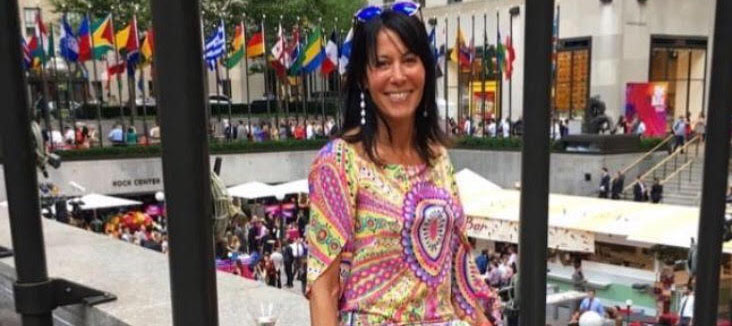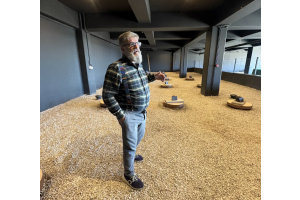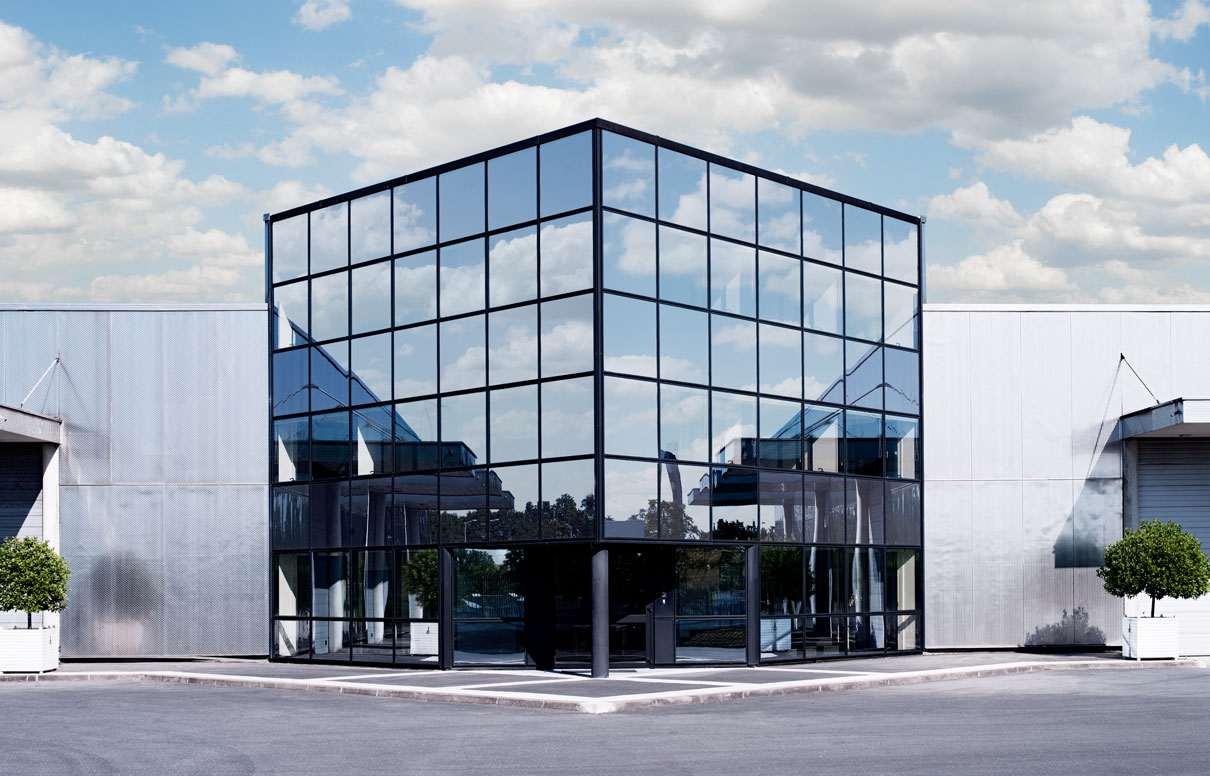
Have you ever noticed that winemakers tend to talk about their wines as if they are people? "My wines are not a big kick in the nose. They need to understand that they are in good company before they open up" said Bruno Paillard, owner of Champagne Bruno Paillard, at a recent seminar in Manhattan.
Bruno Paillard started his Champagne house 36 years ago as a young man of 27. Raised in a family of wine growers and brokers, Bruno was headed down that familiar path, working alongside his father right out of university. Being an ambitious man, he soon approached his father about starting their own winery, but his father said no. Undeterred, Bruno sold his car, a vintage Jaguar, to finance his dream of creating a winery that would bear his name. Since then, the winery has grown to 32.5 hectares of exceptional vineyards, many of them Grand Cru, and a staff of 35 employees — not exactly a large Champagne house but not a small grower either.
Bruno's 'maison' distinguishes itself as the only one exclusively making extra brut Champagne, with the dosage of all of the wines less than six grams per liter of sugar. Long maturation is another characteristic of Bruno Paillard wines. They age for much longer than is required by law and the bottles have always carried the date of disgorgement on the labels. Bruno feels it's important for the consumer to see that his wine has rested after what he calls the 'surgery' of removing the sediment from the bottle. "This bottle is alive," he says, "It is full of life!"
Grape Collective sat down with Bruno to learn more about his philosophy of making very precise, lean and elegant, food-friendly Champagnes.
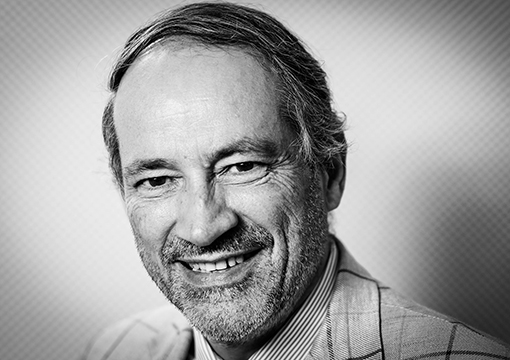
Lisa Denning: For generations, your family has been growing and brokering grapes. Why did you decide that you wanted to start your own Champagne house?
Bruno Paillard: Because I love Champagne. I am passionate about Champagne. And working for six years as a grape broker was interesting. It showed me where the right grapes are and who the right growers are. But at some stage, there is sort of kind of frustration of not going into the process itself. So I decided to start it. I was 27. The kind of thing you do when you are young because you need to be a bit crazy. I did it because I did not know it was impossible.
In Champagne you've got the big houses, you've got the small growers, where does Bruno Paillard fit into this?
We could be considered either a small house or as a large grower. So we are feeling somewhere in the middle. We own 32.5 hectares, which is a minimum of little more than 80 acres I think. And that covers approximately two thirds of the grapes that we need.
There are two reasons why I wanted to develop my own vineyards. First reason was a guarantee of independence or a safety of supply for the long term because you may have heard that there's a kind of grape war in Champagne where we have some enormous players wanting to attract all the grape contracts so it's important to secure our future by owning some vineyards. And the second reason, which is probably even more important, is that we wanted to grow them our way because we like to grow our vineyards in an organic matter. And it's more guaranteed if we do it ourselves than when we use acquired grapes, because even though we are working with passionate family growers we cannot impose on them if they don't want to do it. They are their own independent masters and in Champagne it's complicated because we have 17,000 growers for 34,000 hectares, which means lots of people to make contracts with because the average property is very small. It's about just a little less than two hectares and the total Champagne vineyards of 34,000 hectares is divided in more than 300,000 plots. This makes something complicated in Champagne.
What is your philosophy of winemaking?
The first thing is that we want to have perfect grapes. When I mean perfect grapes I am more interested in the origin of the grapes grown on the right soil and sub-soil, the massive white chalk, then having them arrive at the perfect health condition. I'm more interested in a beautiful grape that might have a little less alcohol content than an overripe grape, which might be partly rotten. I look at the grapes not from an analytical point of view but from a visual and taste point of view, which is the most important. The philosophy of my Champagne is that it starts with the finest grapes but it also starts with respecting the wines, taking the time.
My wines are matured three times longer than the rules request. I also respect the wine by producing very low sugar dosage. I do not even produce brut, I do not produce extra dry, I do not produce demi-sec, which are all sweeter categories. I only produce extra brut, which describes a Champagne with less than six grams residue of sugar per liter. So, it's very little, but in order to produce these wines and to make sure they are not too aggressive in taste, you need to mature them very long. This is what we do.
Let's talk a little bit more about the organic farming. Are all the vineyards that you own organically farmed?
When we acquire a new parcel, it's not necessary the case, so we have between three, sometimes five and six years where we would not necessarily use a grape, because we are transforming the ways a vineyard is grown and in the beginning we have to privilege the roots more than the fruit. If the vineyard has never been ploughed before, the roots have made a very comfortable living quite horizontally. What I want is to oblige them to dig vertically inside the massive chalk, because this is one of the greatest assets of Champagne — the subsoil we have — this white chalk, this white, tender rock that we all know because at school we use it to write on the blackboard. It's this very chalk.
This is a mineral, and some people did not necessarily know that it is of animal origin because it is a residue of sea life, and it is a shell of the sea life. When they die they are eaten by other life, but what is not eaten is actually the shells, and this is what becomes a sediment and that was a long time ago. Forty million years, we were not born. You not, me not, and the weight of the sea compressed this sediment into this soft rock.
How do you feel that farming organically benefits the grape and therefore the final product?
 Sometimes just by tasting you would not necessarily be convinced of the superiority of organic farming. So, it's a very important question. I could answer it's much better. But it's not always possible to detect, to tell the truth. So, for me, it's more a matter of a philosophy. I want to respect these lands. Whatever ways they've been treated before I acquire them, I want to make sure that after me they will be more beautiful lands than when I acquired them. Because I believe in the future of humanity. I am an optimist and I want to leave after me something that is, maybe better than when I found it.
Sometimes just by tasting you would not necessarily be convinced of the superiority of organic farming. So, it's a very important question. I could answer it's much better. But it's not always possible to detect, to tell the truth. So, for me, it's more a matter of a philosophy. I want to respect these lands. Whatever ways they've been treated before I acquire them, I want to make sure that after me they will be more beautiful lands than when I acquired them. Because I believe in the future of humanity. I am an optimist and I want to leave after me something that is, maybe better than when I found it.
In addition to owning vineyards, you also purchase some grapes. Not all of those growers grow organically. Is there a way that you can influence their decisions, as far as growing organically?
Influence is the right word. The answer is yes. We can influence them, but we cannot oblige them. As you know, in Champagne, 90% of the land belongs to 17,000 growers so it is important to convince them, globally, but you cannot force them. So, what I have been, not just me, what many Champagne producers have been working on is new rules that would prevent the use of some chemicals, little by little. It's entering into action. Next step, which would be very important, and which I very much support, would be the final prohibition of glyphosate, of which the commercial name is Round Up. We don't use it at all, but we would want ideally that it's not used at all for all the Champagne vineyards.
How would you describe the taste of your wine, the style of your wine, to someone who's never tried it before?
Well, the Bruno Paillard style is very much a style that has in it a purity, minerality, tension. That's what I am interested in. I don't want it to be perceived as acidic, because it's not. The acidity is very well melted by the long, long, long maturation. What we offer is a wine that has the taste of purity and minerality, and it's something that people can recognize. It's not abstract because I'm sure everybody remembers the taste of chalk when they were at school, you know exactly what I mean. It might sound surprising, but in my wines you will find a little bit of that, of course not just that, it's not prominent, but it is a little bit of that that you find in my wine. And you will find very pure fruit and flower aromas and it leaves you the most absolutely clean taste without any sugar inside, which is the reason in fact why we are so popular in the fine dining scene. Sommeliers and good restaurants around the world like my wines because they're great, food friendly, and surprisingly they can also accompany spicy food, where you would think it needs to be a sweet wine. Not necessary. My Champagne accompanies spicy food very well.
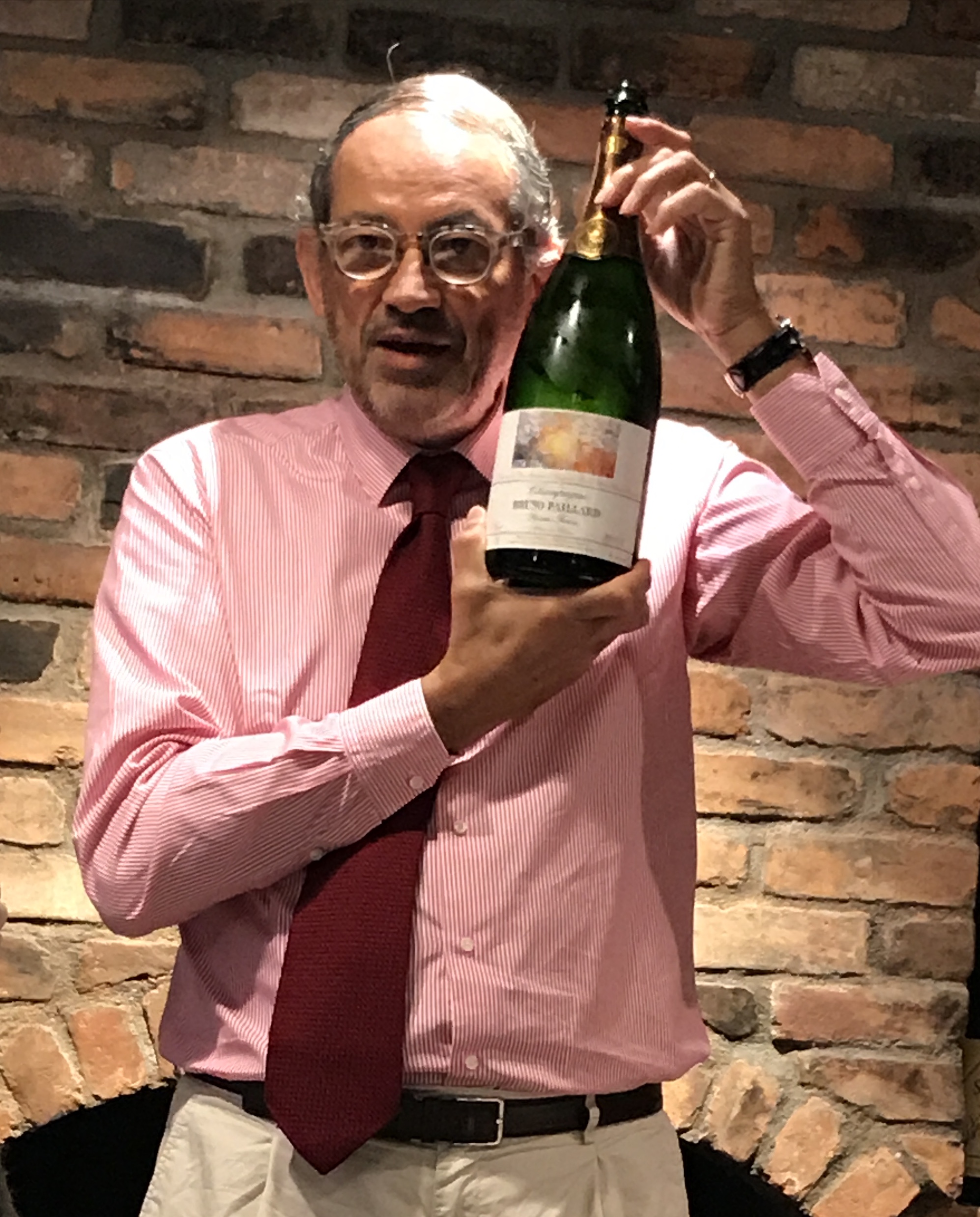 Have you noticed during your time as a winemaker changes in the weather with what many believe is global warming? What have you noticed as far as the impact on your vineyards and has it affected the way you make your wine?
Have you noticed during your time as a winemaker changes in the weather with what many believe is global warming? What have you noticed as far as the impact on your vineyards and has it affected the way you make your wine?
Well, first point it's absolutely clear that there is some sort of climate change. You cannot deny that. For instance, the previous generation say 30, 40 years ago, was normally picking the grapes at the end of September. Mid-October now, this is considered to be a late harvest in Champagne. We pick the grapes now on average in the first half of September, even in August sometimes. I remember a little story in 1976 in the village of Verzeney where my grandmother had a house. I remember I saw a very old gentleman in his 90s, coming out with a little basket and his scissors on the 31st of August, to say, "I want to say that I have been picking grapes once in my life in August." The 31st of August, you see? But since then, it has happened several times in Champagne and he had not seen that in the 20th century,1976. So, it's true that warmer weather accelerates grape maturation to a point that we now often start picking in August. That is the first effect.
The second effect is that in the last 15 years we seem to have more vintage character, probably more than in the '70s, and also in the '80s. If you go any further north there's too much of a combination of humidity and cold weather, so that's why we are at the limit. It's not an administrative decision, or economical decision, it's just the physical decision made by mother nature. So now some vineyards are being planted in England and I have been offered to acquire land in England or to plant vineyard in England but I declined because when you go to England you can see fantastic grass lawns. It's very green, but it's not a Mediterranean climate.
Don't forget that the vines, the vineyards, were born in the south, in the Mediterranean. They came to France 25 centuries ago in Provence, with the Greeks, and 20 centuries ago in the other regions of France with the Romans. As I said, it's mother nature who sets the limit. Today there might be warmer climate in England but it's not a matter of temperature. The climate in England has always been warm compared with Champagne. But, it's also much more humid and it's humidity that's the problem because warmth plus humidity is the best recipe for rot. Unfortunately, you need to fight with chemicals and that is what I try to avoid in my own vineyards, so I'm not going to do it in another country. I think it would be counterproductive even for my own reputation.
Can you tell us about the different wines that you produce?
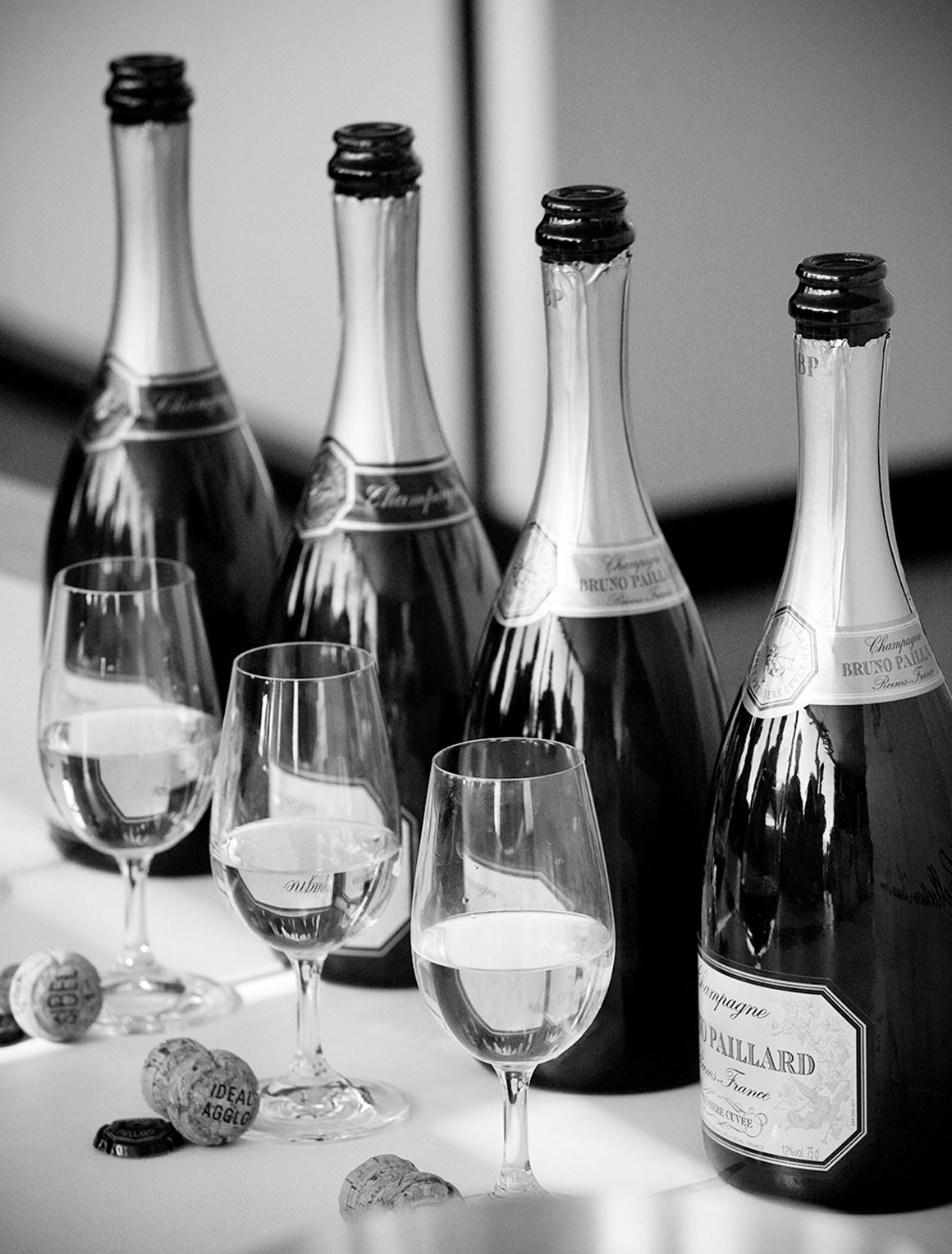 At Maison BP, we have three MVs. I do not like the word "non-vintage" for two reasons. First, it is negative, and second it means nothing. So, I prefer to call these kinds of wines "multi-vintage," which is positive and which explains that it is produced from different years. The three MVs we produce use lots of reserve wines. At least three years on lees, plus six months rest after the disgorgement so they are not released from the winery before they have at least 42 months, and the date of the disgorgement is written on the back label. It has been since the early '80s, I have been the only Champagne producer to give this information on all of my bottles for almost 20 years now, and I'm starting to be copied for 10 to 15 years. I think it's important to show the respect we give to our wine and the respect we give to our customers because it informs that the wine has had the proper recovery rest after the disgorgement which is like a trauma to the wine.
At Maison BP, we have three MVs. I do not like the word "non-vintage" for two reasons. First, it is negative, and second it means nothing. So, I prefer to call these kinds of wines "multi-vintage," which is positive and which explains that it is produced from different years. The three MVs we produce use lots of reserve wines. At least three years on lees, plus six months rest after the disgorgement so they are not released from the winery before they have at least 42 months, and the date of the disgorgement is written on the back label. It has been since the early '80s, I have been the only Champagne producer to give this information on all of my bottles for almost 20 years now, and I'm starting to be copied for 10 to 15 years. I think it's important to show the respect we give to our wine and the respect we give to our customers because it informs that the wine has had the proper recovery rest after the disgorgement which is like a trauma to the wine.
We also produce single vintages. So, the big difference is that in a single vintage I use 100% of the grapes of the said vintage. I do not use any reserves. That's why I change the label completely for each vintage by commissioning a different artist to express one or two words that I give him about the wine and he creates a painting that we put on the label. These are what I call my single vintage artist series and we release them when they have seven to eight years. At the moment we are selling our 2008 and our 2006. So, it's even more than 10 years.
And then at the top of the range, we have a super cuvée, called NPU Nec Plus Ultra. It's a Latin formula, which means 'nothing is more higher.' It's a bit difficult to translate. It may sound a bit pretentious, but it's a wine that is demanding a lot of efforts which we cannot produce in less than 12 to 15 years, which is absolutely unique in Champagne. And it's produced in very limited quantities.
Talking about disgorgement, in Champagne cellars, it's referred to as an 'operation.' Tell me your thoughts on this and why you decided to put the date on the bottle and what it means in terms of the life of the Champagne.
Yes. Well, it is an operation as long as we all agree that this bottle is alive. You agree, I agree.This bottle is alive. It is full of life. Okay? So, what do we do? We open, we remove something, we put something else, and we close. It's like an operation. It's a vocabulary of the cellar workers, not the enologist, the basic workers, they say, "When do we operate on this wine? When was this wine operated on?" I like this formula because it explains exactly what it is. Operation is the same word as surgery and it is a surgery that the wine has to undergo after the bottle fermentation. If we did not do that, our Champagne would be full of little parcels of former yeast, which would make it very cloudy. It would not be bright, and Champagne you want it bright, and you want the sediment to be separated from the wine.
So, this is what we do at the moment of disgorgement, but as I said it is like a little bit of a trauma to the wine, so the wine needs rest after the disgorgement and if you wanted to pursue the comparison with surgery, I would like to add something. It's that this recovery time needs to be longer for more mature wine. Let's take a comparison. If it's a young boy of six years old, for instance, who has an appendicitis operation, a very common, a very simple operation. Maybe after three months he has even forgotten and he's playing football with his friends, you know? But, you're talking of the same operation on a father of 35. Maybe, the father, having the same operation, not more complicated, but the father will need maybe nine months, or 10 months to recover from the same operation. And if you are talking of the grandfather, like me, for instance, if I have that kind of surgery, maybe I would need more than one year and I'm talking of the same surgery, but not the same subject. Comparing with the disgorgement on Champagne, the answer is really that the younger the wine, the faster the recovery. The older, or the more mature, to say more nicely, the more mature the wine, the longer the recovery time.
Your daughter Alice (pictured right) works with you at the winery and you have grandchildren. What do you envision for the future of your winery?
Well, I have always told my children that I had not just four children, I have five, in fact, because number five is the winery. And 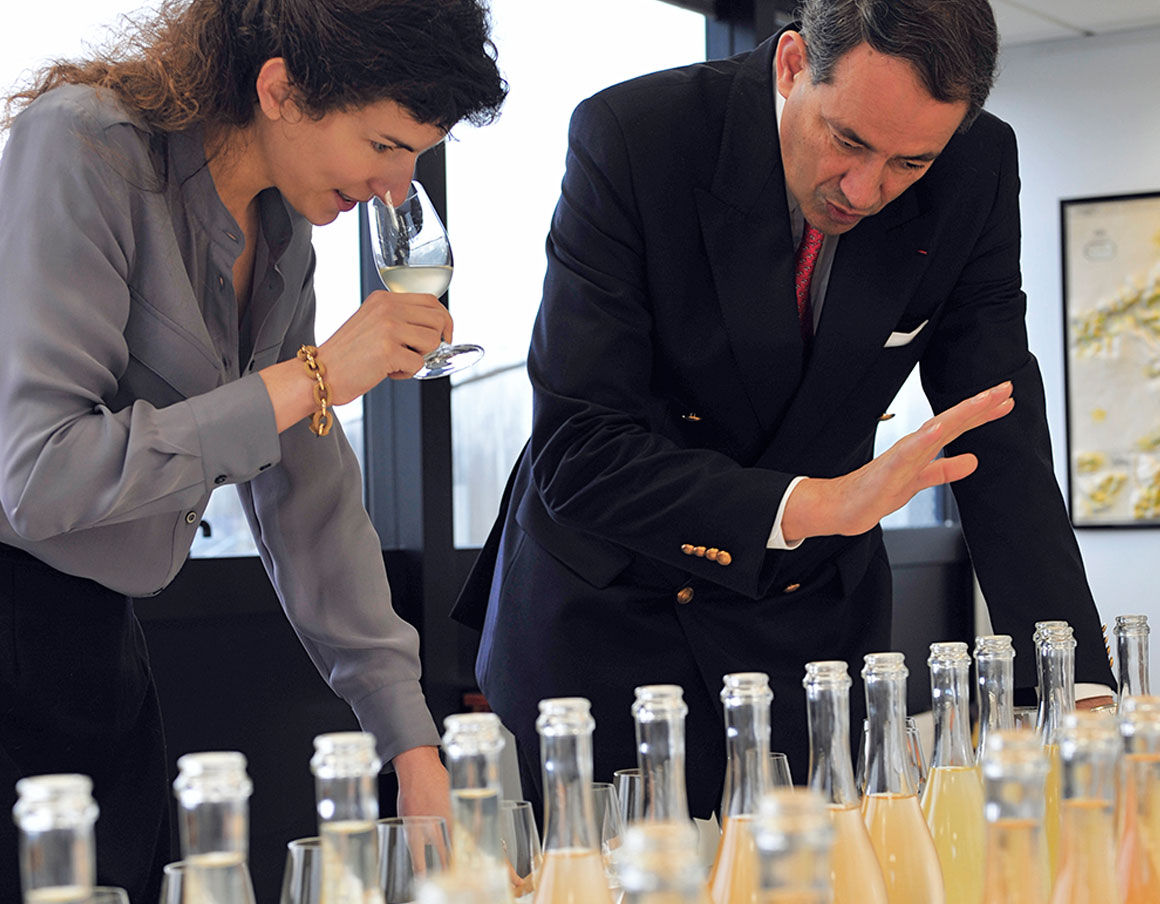 somebody will need, it's like having a little handicapped sister, I would say somebody would need to take care of her. And the winery, Alice is very passionate about it. My two older daughters are both in education and then I have a son who is a grower of wine in Saint Joseph, in the Rhône. Alice is the one who is going to continue with me and she joined the company 10 years ago after she had studied in good schools and worked in big companies in England and also here in New York. When she joined, she insisted she would start one year in the vineyard, so she knows each of my parcels better than myself now. After that she worked in the cellars, so she knows also the work, the cellar work, and little by little she does more and more.
somebody will need, it's like having a little handicapped sister, I would say somebody would need to take care of her. And the winery, Alice is very passionate about it. My two older daughters are both in education and then I have a son who is a grower of wine in Saint Joseph, in the Rhône. Alice is the one who is going to continue with me and she joined the company 10 years ago after she had studied in good schools and worked in big companies in England and also here in New York. When she joined, she insisted she would start one year in the vineyard, so she knows each of my parcels better than myself now. After that she worked in the cellars, so she knows also the work, the cellar work, and little by little she does more and more.
Your wines are in over 500 Michelin-Starred restaurants. What do you think it is about your wines that make it such a good food pairing wine?
Well, it's true that we are in more than 500 Michelin Star restaurants, which is enormous for such a small Maison, but it's not by chance. Two reasons for that. First, is that these kind of diners are the customers that we target, and the reason why we target them is that it is very much for them that we work. Our wines have this purity, a little bit of tension that is extremely food friendly. They match food very well. They do not conflict because of over-acidity or too much sugar, or sweetness in them. So they respect food extremely well. This is a reason why we have so many people following my wines. BP Champagnes are on quite a few really great wine lists in the world.
And what do you enjoy the most about winemaking?
What do I enjoy the most? Oh my god, I think I enjoy everything. But there is one time period which goes from mid-March to the end of June, where we are involved with more than the technical part of the job, and this is the artistic part of the job, which is where we do the composition of the cuvées. This is done by a series of tastings, well I call it a tasting, but I work only with the nose and I make a number of decisions to create the composition of the cuvée. These are really fascinating moments because this is the closest that you can touch on the fact that Champagne is really full of life. We have 120 or 130 best wines. The diversity is just incredible. How will this one compliment that one? You know, it's like making sure that the first violin is going to be working well with each of the instruments of the orchestra.
It's always a fascinating period because it's not as technical, it's more artistic but you have to have a clear view of what you want to achieve and also the technical aspect of it is that you have to know what each sample tells you today will bring in a few years time. This is probably the most difficult thing to explain and to transmit, but Alice is now joining me in doing this job and of course our cellarmaster has been doing it with me for many, many years. He has been with me for 25 years now, nearly.
And what do you find the most challenging about making wine and Champagne?
The most challenging aspect for me is not so much making the wine because I think we have a certain style I want to create. Not everybody likes it, but it's what I did. For me the biggest challenge is selling it in some countries, like here in America, for instance, it is very complicated. Italy is only market number six or seven, but for me it's three times the size of the U.S. market, and Japan is about the same thing. Why is that? It's because we have a proper importer, distributor, who does a great job. Here in America, with the system of licenses, it's very complicated because everybody has, by law, to go through small number of distributors and these distributors, very often, they have already too many Champagnes. Including very big names that they are selling for many, many years, and they are not waiting for me. So, my main difficulty here is to have access to the sommeliers through these distributors who don't necessarily have time. But here in New York, we are with Verity, and they are very nice people, so I am hopeful that we will do something successful, at least in New York.
What are you drinking when you're not drinking your own wines?
I like many different kinds of wines. I mean just in France, in Champagne, we have always had a tradition to drink Bordeaux, so I have a few bottles of those wines in my cellar. We have some good friends in Burgundy, so I drink some Burgundy wines. I also happened to have acquired a few years ago, in fact 25 years ago, a little vineyard in Provence, where we grow organically certified grapes, it is named Château des Sarrins, and we drink this wine. We have just released 2014 vintage red, and obviously we produce mostly rosé here because it's Provence but I like to produce red because it's a relatively high-altitude vineyard.
I'm a great fan of red Italian wines. I think in Italy you have absolutely fantastic red wines. I'm not going to do some name dropping, but I have quite good friends in Italy and also in Germany and it might surprise you, but I like Riesling wines and I think they have a very interesting kind of minerality in some of them, so I like them.
There are so many. I cannot say too much about American wine because I don't know them very well and I think there is such a diversity of American wines here. The thing I don't like in America I can tell you, frankly, is the fact that some producers steal the identity of European wines and pretend they make Chablis, pretend they make Champagne, pretend they make Chianti, whatever, so that I think is very sad and I hope these people will just stop misusing European geographic indications in the not-too-long future. But I have tasted very nice sparkling wines from Napa, for instance, which do not use Champagne in the name, so I respect them.
Read more from Lisa Denning on Grape Collective and on The Wine Chef.
